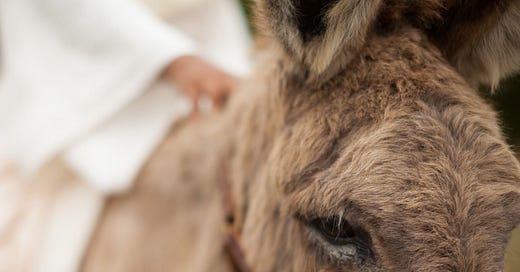The Triumphal Entry before Jesus
With Holy Week right around the corner, this seems like a good time to post my April 14, 2019 article with the Gospel Coalition. My thanks to Megan Hill, a favorite editor and author.
Every year on Palm Sunday, children enter our worship service with palm branches, delightfully waving to the congregation (or devilishly whipping one another) in celebration of Jesus’s entry into Jerusalem. Many know the story of the Lord Jesus entering Jerusalem on a donkey to the adulation of the crowds.
But not everyone knows that long before Jesus entered Jerusalem on a donkey—hundreds of years before he was even born—another man rode a donkey into Jerusalem. And in that first triumphal entry, we uncover precious truth about the second.
Cold King, Conniving Prince, Ruthless Partnership
Our story begins in 1 Kings. Here, King David—the boy who defeated giants as a child and who conquered armies as a youth—is an old man too sick and weak to warm himself (1:1–4). It’s clear to everyone that David’s life is almost over. Soon there will be a new king.
One of David’s sons, Adonijah, decides he wants to be king (1:5–10). He starts by forging two strategic relationships—one with the military leader, Joab, and one with the priestly leader, Abiathar. He gathers them for a private coronation party.
Alert readers know David had already appointed Solomon to be the next king (1 Chron. 23:1; 29:22). Adonijah’s power play, then, was a hostile takeover and a murderous threat to his rivals—his royal brother, Solomon, and his queen mother, Bathsheba. But even more, it was a threat to God’s promises. The Lord had promised David would have an enduring royal dynasty (2 Sam. 7:12–13), specifically through Solomon (1 Chron. 22:9–10).
This family crisis was a life-and-death struggle for the kingdom of God.
Brave Woman, Faithful Prophet, Rightful King
Bathsheba enters our story to alert the clueless King David about what’s happening in his kingdom (1 Kings 1:11–27). Bathsheba and the prophet Nathan remind David of the oath he made in response to God’s covenantal promises (Bathseba’s name actually means “daughter of the oath”).
David affirms his plans to crown Solomon (1:28–31) and moves into action (1:32–37). He summons Nathan, Zadok, and Benaiah—a godly prophet, a godly priest, and a godly adviser to the king.
David gives his royal mule (a sort of ancient Air Force One) to Solomon and parades him into Jerusalem from the Gihon Spring across the Kidron Valley. Solomon was anointed and enthroned in public with triumphant celebration. This is no secret self-exaltation like Adonijah’s private party, but God’s people publicly celebrating God’s king with a loud cheer (1:38–40). The private party for Adonijah dissolves as the cheers for Solomon drown out the imposter coronation (1:41–49).
First Triumphal Entry Points to Second
Solomon’s entrance into Jerusalem on a donkey across the Kidron Valley and the Gihon Spring (1:33, 38) declares the true king. It announces that the priestly leader Abiathar—and all the religious leaders following him—are phonies. It announces that the military leader Joab—and all his military powers—aren’t in charge. This one, this king on a donkey, is the true son of David.
On Palm Sunday, we celebrate Jesus retracing Solomon’s path across the Kidron Valley and entering Jerusalem on a donkey (Matt. 21:1–10). It’s certainly a picture of humility—entering on a donkey instead of a war horse (Zech. 9:9). And it certainly evokes a contrast between God’s kingdom and the sort of entrance that Herod or Pilate would’ve received as they entered the city that week.
But as a reflection of Solomon’s coronation, Jesus’s triumphal entry teaches us even more. It testifies that the scribes and Pharisees—the religious leaders who opposed him—are phonies. Like the sons of Eli, they are disqualified from representing the true and living God (1 Sam. 2:31ff). And it also says that Rome with all its military might isn’t in charge. Even the blind could see (Matt. 20:30–31) that Jesus, this king on a donkey, is the true son of David (Matt. 21:9, 15).
Here, at last, is the true king.
Greater-Than-Solomon Is Here
Thankfully, Jesus’s kingship is unlike Solomon’s in many ways.
Solomon disbelieved God and trusted in idols; Jesus never did. Even while suffocating to death on the cross, Jesus committed his spirit into the Father’s hands (Luke 23:46).
Solomon sinfully took for himself foreign queens to bolster his own status (1 Kings 11:1–4), but Jesus gave himself up for his bride, the church. Solomon was polluted by his foreign wives (Neh. 13:26), but Jesus cleansed and sanctified his bride, “so that he might present the church to himself in splendor, without spot or wrinkle or any such thing, that she might be holy and without blemish” (Eph. 5:27).
Solomon built a temple, but then he led his people to worship foreign idols. Jesus established a new temple and is the worship leader for his assembled people: “I will tell of [the Lord’s] name to my brothers; in the midst of the congregation I will sing your praise” (Ps. 22:22; Heb. 2:12). Solomon led his people down the path to exile; Jesus becomes the path to God—the way, the truth, and the life (John 14:6).
Solomon died, just like David died (1 Kings 11:43). But Jesus rose from the dead to give everlasting life—not only to David and Solomon but to all his royal sons and daughters (Heb. 2:10).
This Palm Sunday, we celebrate the triumph of the second king to ride into Jerusalem on a donkey. He enters to the praise of children and adults, unmasking all pretenders to his throne and reminding us that he—and he alone—is the only king worth following.




